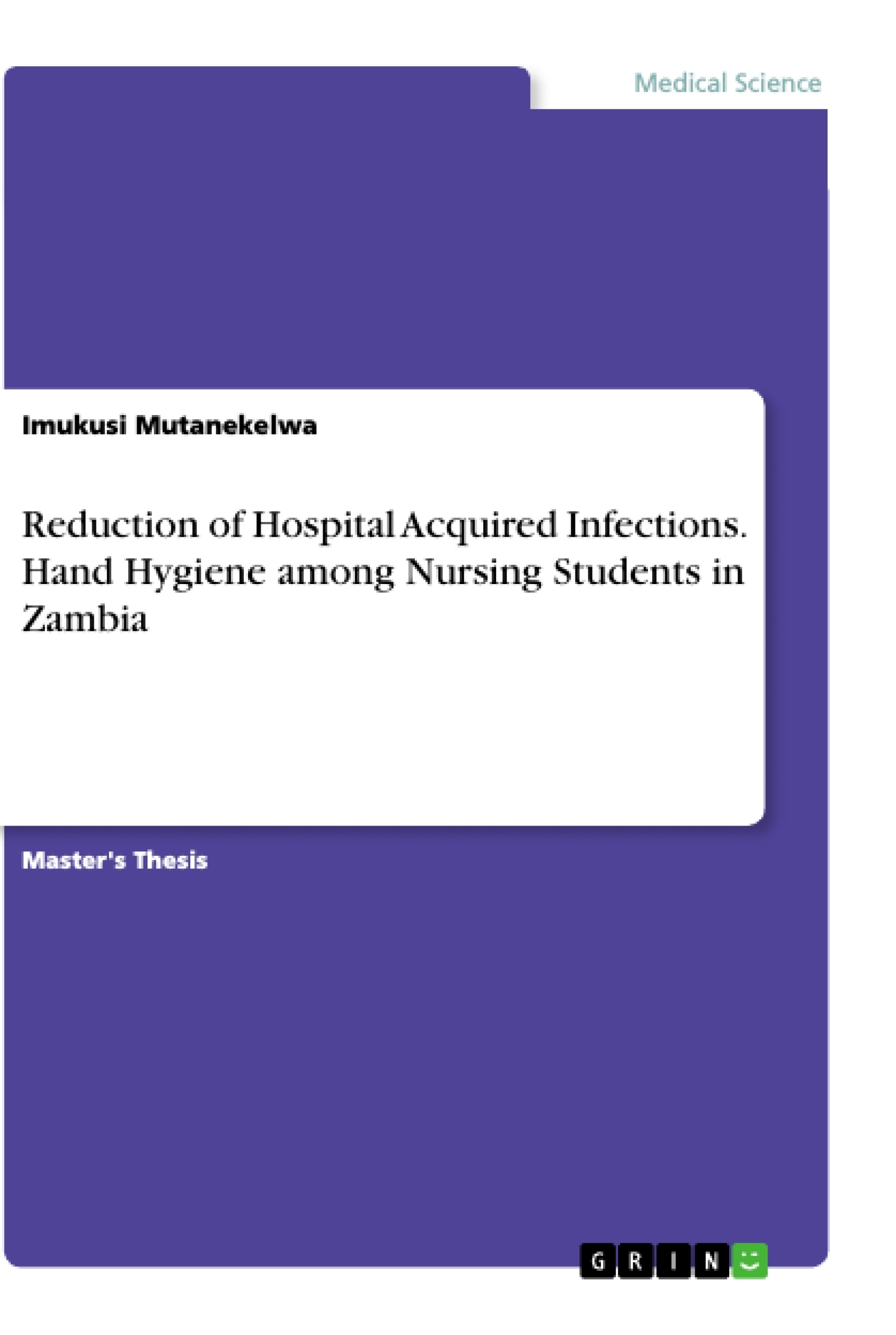This work determines the demographic/training factors associated with the hand hygiene knowledge of nursing students in Solwezi, Zambia and aims to provide information for necessary actions in order to reduce Hospital Acquired Infections (HAI).
A quantitative cross-sectional survey using primary data collected via a WHO validated self-administered questionnaire has been distributed to students at the Solwezi College of Nursing. 167/206 participants were recruited via stratified random sampling. Descriptive statistics highlighted potential relationships between demographic/training factors and students hand hygiene knowledge which reduces HAI. Moreover, potential relationships were analysed using Fishers exact test and a multinomial logistic regression.
The low compliance to effective hand hygiene has continued to fuel the high prevalence of Hospital Acquired Infections in Africa. The large number of nursing students has a potentially high impact at reducing the HAI public health problem in Zambia, however, there is insufficient information on the nursing student’s demographic/training factors affecting their hand hygiene knowledge which reduces the HAI risk.
Inhaltsverzeichnis (Table of Contents)
- ABSTRACT
- ACKNOWLEDGEMENTS
- LIST OF ABBREVIATIONS
- LIST OF TABLES
- LIST OF FIGURES
- CHAPTER 1: INTRODUCTION
- 1.1 Background to the Study
- 1.2 Statement of the Problem
- 1.3 Justification of the Study
- 1.4 Research Questions
- 1.5 Objectives of the Study
- 1.6 Significance of the Study
- CHAPTER 2: LITERATURE REVIEW
- 2.1 Hand Hygiene and Infection Prevention
- 2.2 Hand Hygiene Compliance in Healthcare Settings
- 2.3 Factors Affecting Hand Hygiene Compliance
- 2.4 Hand Hygiene Practices in Zambia
- 2.5 Interventions to Improve Hand Hygiene Compliance
- CHAPTER 3: METHODOLOGY
- 3.1 Study Design
- 3.2 Study Setting and Population
- 3.3 Sampling Procedure
- 3.4 Data Collection Instrument and Procedure
- 3.5 Data Analysis
- CHAPTER 4: RESULTS
- 4.1 Socio-demographic Characteristics
- 4.2 Hand Hygiene Knowledge
- 4.3 Factors Associated with Hand Hygiene Knowledge
- CHAPTER 5: DISCUSSION
- 5.1 Hand Hygiene Knowledge and Practices among Nursing Students
- 5.2 Factors Associated with Hand Hygiene Knowledge
- 5.3 Implications for Practice
Zielsetzung und Themenschwerpunkte (Objectives and Key Themes)
This study aimed to identify demographic and training factors associated with nursing student's hand hygiene knowledge in Solwezi, Zambia. The study sought to provide information for action necessary to reduce Hospital Acquired Infections (HAI).- Hand hygiene knowledge and practices among nursing students
- Factors affecting hand hygiene knowledge, including demographic and training factors
- The impact of hand hygiene on the incidence of Hospital Acquired Infections (HAI)
- Interventions to improve hand hygiene compliance among nursing students
- The role of education and training in promoting hand hygiene practices
Zusammenfassung der Kapitel (Chapter Summaries)
- Chapter 1: Introduction This chapter provides the background, statement of the problem, justification, research questions, objectives, and significance of the study. It highlights the importance of hand hygiene in reducing HAI and the need to understand factors influencing hand hygiene knowledge among nursing students.
- Chapter 2: Literature Review This chapter reviews existing literature on hand hygiene, infection prevention, factors affecting hand hygiene compliance, and interventions to improve hand hygiene practices. It also discusses the specific context of hand hygiene in Zambia.
- Chapter 3: Methodology This chapter describes the study design, study setting and population, sampling procedure, data collection instrument and procedure, and data analysis methods used in the research.
- Chapter 4: Results This chapter presents the findings of the study, including the socio-demographic characteristics of the participants, their hand hygiene knowledge, and the factors associated with hand hygiene knowledge.
- Chapter 5: Discussion This chapter discusses the results of the study, drawing conclusions about the hand hygiene knowledge and practices of nursing students, factors influencing their knowledge, and implications for practice. It explores strategies to improve hand hygiene compliance and reduce HAI.
Schlüsselwörter (Keywords)
The primary focus of this research is on hand hygiene knowledge and practices among nursing students in Solwezi, Zambia. This includes identifying factors influencing hand hygiene knowledge and exploring implications for improving infection prevention practices. The study is grounded in the context of Hospital Acquired Infections (HAI) and emphasizes the role of education and training in promoting hand hygiene compliance. Key terms include nurse, infection prevention, hand hygiene, Hospital Acquired Infection, primary prevention, and Zambia.- Arbeit zitieren
- Imukusi Mutanekelwa (Autor:in), 2019, Reduction of Hospital Acquired Infections. Hand Hygiene among Nursing Students in Zambia, München, GRIN Verlag, https://www.grin.com/document/535696



